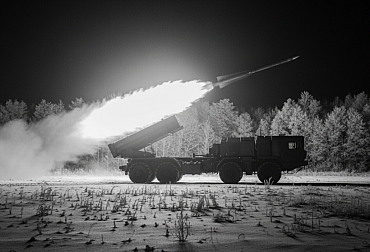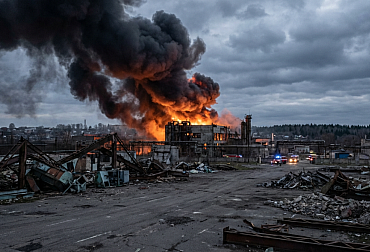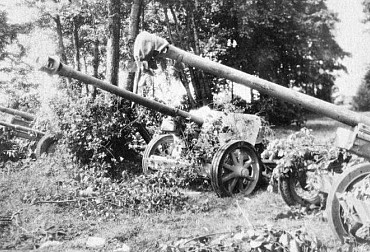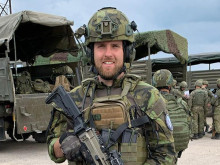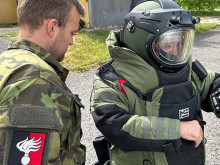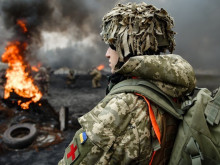Gen. Ivo Střecha: NATO, the EU and the whole democratic world now face many security challenges
This year, the Czech Republic celebrates 25 years since it joined the North Atlantic Treaty Organization. It happened on 12 March 1999. The Alliance was founded in 1949 as a counterweight to the growing threat of the Soviet Union and its Eastern bloc, and today NATO's relevance to the Russian aggressor is being reaffirmed. We discussed the current role of the Alliance and the membership of the Czech Republic and the Czech Army in NATO with the military representative to NATO and the EU, Gen. Ivo Střecha in the following interview.
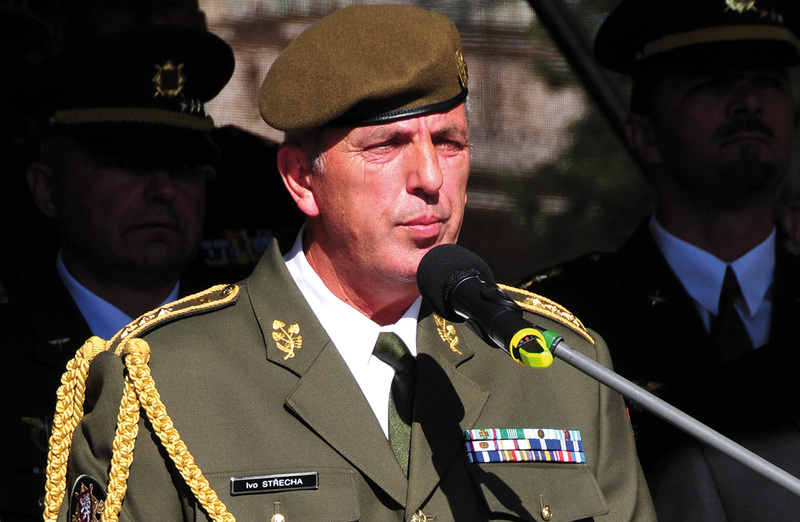
We are celebrating the 25th anniversary of the Czech Republic joining NATO. In your opinion, is the Czech Republic today a full member of the Alliance or does it still have some catching up to do?
The Czech Republic is part of the Alliance, which has long been focused on solving security challenges mainly in the Balkans but also outside the Euro-Atlantic area. All strategies and concepts of building the capabilities of the armies of the member states, not excluding ours, have been pragmatically subordinated to this. In this endeavour, the Czech Republic has fulfilled its commitments to the Alliance without fail. We can be proud of the performance of our soldiers and civilian experts in the missions in Bosnia and Herzegovina, Kosovo, Iraq and Afghanistan.
In any case, we probably cannot avoid assessing not only the Czech Republic but also the Alliance as a whole in the context of a fundamental capability for common defence, the ability to wage conventional war in defence of Alliance territory. In this respect, we have somewhat succumbed to the illusion of perpetual peace, and a conflict like the one in Ukraine today seemed hard to imagine. Defence planning was not focused on a specific threat, but rather on more universal capabilities that we would use in the event of a crisis that seemed most likely in the past decades. And a major war it undoubtedly was not. In that context, we have kind of forgotten about things related to state resilience, a whole-of-society approach to defense.
But that does not mean that NATO is incapable of fulfilling its basic mission. It is still the largest and most powerful military grouping in the world, with technological superiority and an industrial base. It is now working incredibly fast to address the shortcomings that have accumulated during a relatively benign security environment. Alliance ties have been strengthened, we are closer together, and overall the Alliance is becoming stronger than it was a few years ago. The Czech Republic, as well as our partners, still has a lot to deal with.
NATO member countries have regular joint exercises to unify certain command and control procedures and overall sharing of experience. Is there any specific benefit of the Czech Army for other Alliance member countries in this respect (tactics, training, etc.)?
Joint exercises are an integral part of the Alliance's preparation for dealing with potential crises. During its membership, the Army of the Czech Republic has worked its way up from the position of a newcomer to the Alliance to an experienced member that is fully integrated and has mastered key processes in the field of planning, organisation and combat management according to Alliance standards. It has a newly established four-year cyclical operational training system focused on achieving the Army's target capabilities for operational deployment. This is closely linked to the Alliance defence planning system. To simplify it a bit, we no longer train individual units only for specific missions or for cash forces. We are training the entire army to perform the whole range of tasks given by the laws of the Czech Republic for the defence of the Republic and resulting from our commitments to the Alliance, the activities of the EU, or the UN. This new system has been appreciated by the Alliance in our bilateral talks to assess the Czech Army in the area of defence planning and we can offer our knowledge and experience.
We have also set up a system for collecting knowledge and experience from operations and exercises. Unfortunately, it is not fully used and its findings are not fully implemented in future plans to address what we have failed to do. And as some foreign partners say of us with exaggeration, we Czechs are afraid to make mistakes, but we are not afraid to repeat them. An example is the series of exercises called DOLNÉ ČESKO, where every two years we regularly exercise the entire command and control system of the Czech Armed Forces in dealing with tasks related to the defence of the Czech Republic. We analyse what we have managed and failed to do, but the proposed measures to improve the situation are only partially implemented or not at all. And, of course, we will identify the same problems in the next exercise. The causes are a bit in the stereotypes of people's thinking, their unwillingness to solve complex problems, which are sometimes connected with changes in competences, organisational structures, but also with investments and require the necessary time. Sometimes we focus too much on things that have an immediate effect without taking into account the need to maintain this effect in the long term. A bit of a Potemkin village.
Do you see the increasing unification of military equipment (F-35s, Leopard 2 tanks, etc.) within NATO as an advantage? And what potential pitfalls might this trend bring?
The whole issue has to be looked at from several angles. The unification of platforms across the Alliance certainly has a positive impact in terms of interoperability, logistical support, communication and information support and concentration of industry efforts. However, another angle is diversification. The Alliance must retain the ability to surprise adversaries with something that is different from the majority of weapons, weapons systems, etc. For the Army, given its size, diversification is perhaps only possible in areas where we have quite unique capabilities. Such as passive systems, electronic warfare, or protection against weapons of mass destruction. In other areas, I would leave it to our partners with larger armies and resource capabilities.
Will the adopted Czech Defence Strategy 2023 in any way affect or expand the existing capabilities of the Czech Armed Forces as a NATO member?
The new defence strategy is, for obvious reasons, influenced by the current state of the security environment and its perception. It already shows clearly where the problem lies. It shows the threat that we were afraid or unwilling to name out loud in the past. It also describes, with far greater emphasis than before, the fact that the defence of the Republic is not just a matter for the Ministry of Defence and the Government, but for all of us. Words such as mobilisation, war economy, national resilience are again used. Words that were not used much in the past decades.
From the point of view of the construction of the Czech Armed Forces, there is nothing fundamentally revolutionary that would make the Alliance shake its head in admiration. The resource reality is what it is, and the idea that in a given timeframe we will build, for example, a manoeuvre ground division, substantially increase air defence capabilities and other areas is beyond reality. The internal debt that has accumulated over decades towards the capability of the armed forces is large and cannot be removed in a few years.
What negotiating position does the Czech Republic have in the Alliance given its size?
Consensus is the key word in the Alliance, so every vote has equal weight regardless of the size of the country, the army. Still, it is quite logical that the opinions of the larger ones are perceived a little differently. In order to play a more significant role, we need to more consistently fulfil our domestic tasks assigned by the Alliance, including the allocation of resources for defence from the state budget. Similarly, we should seek to exert more influence on the direction of the organisation through active engagement across the full spectrum of governance structures, perhaps including personnel in senior positions. There, in my view, we have large margins compared to some partners of similar size.
Do you see any difference between the political and military management of the Alliance?
I would be wrong to say that I do not see any difference. By definition, each element has a different role. I can say from my current position that within the Alliance and their permanent structures, the cooperation between the military and the politician/diplomat is very solid. Communication is frequent and one side tries to understand the other's position. I would say the crisis has taught us better communication.
For the soldiers, the solution to each problem is pretty clear. The soldier has an idea of what the war is about. It's easier than what a politician has to deal with. In the context of today's events, crises of all kinds, it is the politician who has to convince the citizens that investment in defence, in the resilience of the state, is necessary and that the citizen will lose some of his comfort as a result. He must convince industry that it, too, must contribute, must bear the risks, that it is not just about profit, but about working together so that we can maintain our preferred way of life, our values.
The completion or modernisation of the 'heavy brigade' is 5 years behind the original plan. How much potential complication does this bring in NATO structures?
The brigade has been in existence for several years, it has all the attributes of what a brigade needs to fight and, if necessary, it will fight with what it has. The personnel are ready. Of course, nobody is going to praise us for the fact that key weapon systems have not been renewed and some of the ammunition is missing.
We, rather than the Alliance, should be interested in why this is so. And that analysis needs to be done by the military and the politicians. What to change in our work so that this does not happen in future modernisation projects. Rather than WHAT, we need to ask HOW we do these things. The Department's little willingness to at least think about this has bothered me since I joined the General Staff and understood the complicated processes. Simply put, war is around the corner and we have the same processes, organizational structures, legal framework, staffing levels for acquiring weapons, ammunition as we did x years ago when the security environment was far more conducive.
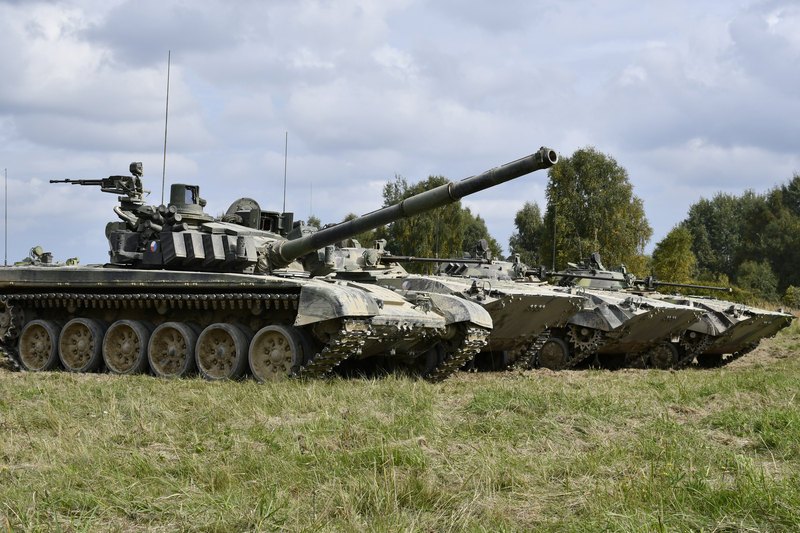
How does the Alliance perceive the modernisation processes of the Czech Armed Forces? Do you have any comparisons (e.g. the method or length of acquisitions) with the modernisations taking place in other NATO countries?
I think that the general perception of the efforts to modernise our army is positive, but we are not the only ones. There are countries whose plans for the construction and development of their armed forces are far more ambitious, such as Poland or Romania.
Until the conflict in Ukraine, the length of the acquisition process was not significantly different from that of other countries. Now the situation is radically different. There are many customers for new weapons systems and ammunition across Europe and the military industry is not yet fully capable of responding flexibly to the new reality. The new reality is represented by the continued support to Ukraine and the parallel addition or increase in our own needs. This is a very big bite for industry, the banking sector and other sectors.
By 2030, the Czech Armed Forces should have 30 000 professional soldiers and 10 000 soldiers in active reserve. Given the growing tensions, is it not appropriate to consider building an even more powerful army, and is this even realistic in the Czech context? It seems that even the current personnel target will be very difficult to meet.
Whether or not to have a larger military is primarily a question for the citizens of this country and those who represent them. According to the revised strategies and concepts, there is clearly no appetite for this. However, thanks to our membership in the Alliance and our geographical location, our role in the current situation is clear, and so are the tasks arising from it.
This requires us today to upgrade and properly equip existing units, to strengthen our capabilities in the field of air defence, logistic support, providing support to host countries, and to replenish our stocks with key commodities, especially sophisticated munitions.
Last but not least, we need to figure out how to sustain all of these capabilities in the event of a protracted conflict, both in terms of personnel and replenishment.
I think this is doable with a small increase in professional army numbers, but mainly by adhering to the goals of building active reserve units that will form the large core of the territorial forces and the reserve to supplement the professional forces. The ability to mobilise will have to be maintained. The example of the conflict in Ukraine clearly demonstrates this.
Only time will tell whether all this will require the introduction of compulsory military service in some form less burdensome for citizens.
In the material field, it is essential to acquire weapons systems, including the necessary backup to cover losses, and last but not least, it is important to maintain and develop the capabilities and capacities of our defence industry.
What capabilities do you think the Alliance should develop in the future to have the greatest potential to deter adversaries?
NATO, the EU and the entire democratic world now face many security challenges across a spectrum of potential threats - the war in Ukraine, the fragile situation in the Balkans, the Middle East, Africa in the form of adverse developments in the Sahel, the Red Sea and last but not least the current state of tensions in the Indo-Pacific. All these events have an impact on our security, on our way of life, and they cannot be ignored.
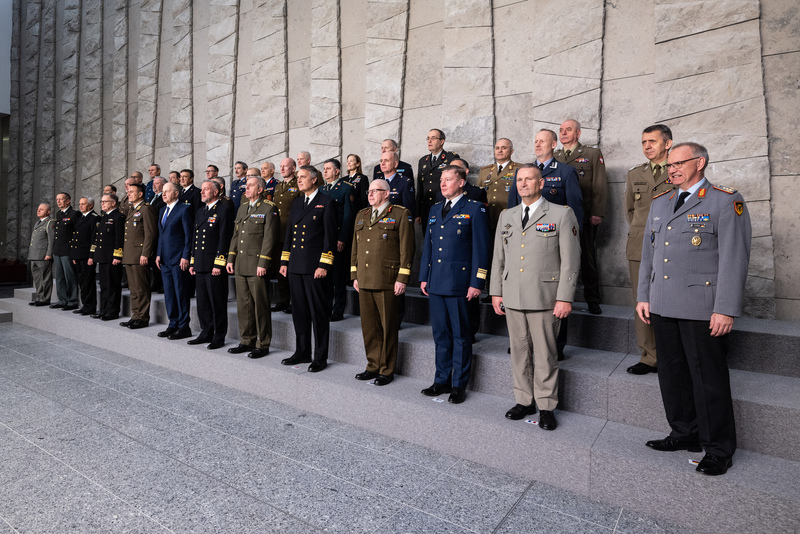
We can talk about a lot of technological advances, sophisticated weapon systems that can give the Alliance technological dominance on the battlefield, but what is an absolute priority from my perspective is not about technology - it is about the cohesion and will of the individual members of the Alliance to fulfill the fundamental preamble of the Washington Treaty, as well as the ability to create effective partnerships on a global scale. This is a task for politicians and, consequently, for the armed forces. If it can be done, it will give us the greatest deterrent effect.












